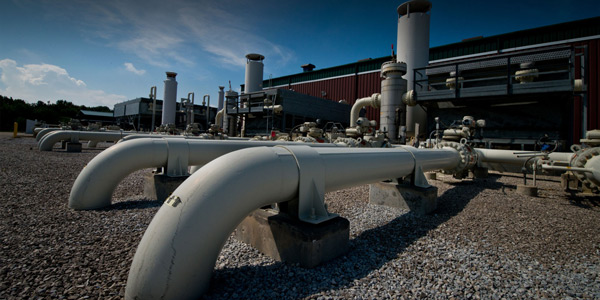By Amanda Durish Cook
FERC on Tuesday approved a MISO pilot program allowing the RTO to share information on power plants’ gas use with pipeline operators (ER17-1556-001).
Starting in December, MISO will share day-ahead hourly burn estimates from gas-fired generators with a trio of gas operators: Northern Natural Gas, ANR Pipeline and DTE Energy. The RTO says the program will help ensure adequate fuel supplies for gas plants.
FERC agreed that the program complies with the communications permitted in Order 787.
“We find that MISO’s proposal to extend the information sharing provisions to LDCs [local distribution companies] and intrastate natural gas pipeline operators will help ensure and optimize the reliable operation of the grid, particularly during the winter months where demand for natural gas is strongest,” the commission said.
The commission noted that Order 787 encouraged grid operators to make Tariff filings “to facilitate greater sharing of nonpublic, operational information with entities such as local distributions companies.”
“We note that the proposed revision will improve communication and coordination among MISO and operating personnel of the interstate natural gas pipeline companies in the MISO region to ensure that MISO and interstate natural gas pipeline control room operators have better information on which to base operating decisions,” FERC said.
The acceptance comes after FERC in June issued MISO a deficiency letter in response to an earlier version of the proposal. The letter noted that the pilot lacked a no-harm clause and that the RTO failed to justify its reason for sharing confidential information with LDCs, which FERC must approve on case-by-case basis. (See FERC: MISO Gas Data Sharing Plan Falls Short.)
In response, MISO amended its filing with language borrowed from PJM that expressly states that any shared information will not be used “to the detriment of any natural gas and/or electric market.” MISO also contended communication with LDCs is crucial because about 25% — or 12,511 MW — of the RTO’s gas-fired capacity is served by the companies.
FERC accepted both responses, saying that MISO’s use of nondisclosure agreements and restrictions placed on shared data “minimizes the opportunity that the information can be used in an unduly discriminatory or preferential manner by the recipient or to the detriment of the market.”
The commission rebuffed Indianapolis Power and Light’s protest against the pilot. The utility asked that MISO not be allowed to “grant itself the ability to provide proprietary data to anyone without the expressed consent of the generation owner.” FERC, however, noted that Order 787 did not require “three-way communications” for such programs.
Some MISO stakeholders earlier this year voiced opposition to the pilot, saying it could affect reliability if participating gas operators make burn rate decisions relying solely on partial day-ahead data. (See MISO Stakeholders Question Electric-Gas Info Sharing.)





